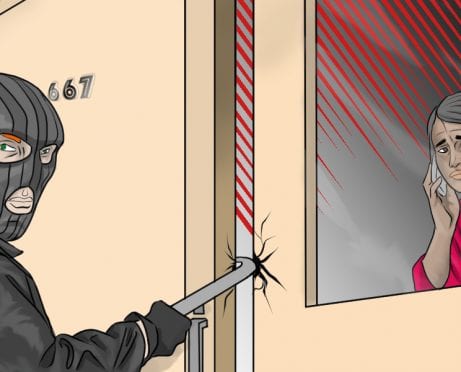
 “All this for only $750 a month?” Jenny asked, astonished. She couldn’t help but be a little suspicious. There must be a catch. But Jenny couldn’t see a reason to say no. Besides, with her new job starting in a few weeks and her old lease coming to an end, she knew she needed to find housing quickly.
“All this for only $750 a month?” Jenny asked, astonished. She couldn’t help but be a little suspicious. There must be a catch. But Jenny couldn’t see a reason to say no. Besides, with her new job starting in a few weeks and her old lease coming to an end, she knew she needed to find housing quickly.
This App Makes Managing Your Finances Easy — Start Budgeting Today >>
Aside from a few seasonal insects and a faulty light outside her door, her first few months in the new apartment were perfect. When she called the rental management company to report these issues, they redirected her to the building’s manager, a man whom she had seen roam the hallways of her place, but whom she had never met.
Unexpected Retaliation
What she thought was a perfectly reasonable request (to fix a light) became a full-on confrontation over housing. The property manager began retaliating against her, illegally locking her out of her own apartment and entering the apartment while she was out.
Her complaints to the owners of the building only intensified, and she began to fear for her safety.
It all came to a head one evening when she returned home to the distinct odor of natural gas. Earlier that day, the property manager had turned off the gas for repairs and vented every apartment. That is, every apartment except hers. Gas flooded into her space, forcing her to call the police and evacuate. Later, the gas company told her that the levels were so high that she could have died.
With a police report in hand, Jenny had enough evidence against her property manager to demand to be let out of her lease three months early. However, the company refused, forcing Jenny to hire a lawyer knowledgeable in dangerous rentals. She estimates that she paid roughly two months’ worth of rent to be released from her lease without damaging her credit or rental history.
Check Your Credit Score for Free — Visit Site >>
Lesson Learned
Today, Jenny still rents, but she's much more cautious when it comes to finding a new place. First and foremost, she says, she doesn't sign on until she meets everybody who has access to her apartment.
For many renters, the pressure to find acceptable housing pushes them into less-than-ideal accommodation. The quality of life in a rental will also depend on who owns or manages the property — you could be doing more harm than good by not interviewing a potential landlord.
What Should You Do?
Before you even interview the landlord, look him up online to get a sense of who you'll be dealing with. Many renters like Jenny meet with the property company to sign the lease, but don't get access to the property manager until move-in. I would strongly recommend a one-on-one chat with him, if only to check for signs of future trouble.
Some questions to ask a potential landlord about housing include:
- What are your move-in and move-out policies?
- What is the best way to reach you during the day or evening, in an emergency, or over holidays?
- Who should I contact if you aren't available?
- What types of repairs would you prefer that I do myself?
- What sort of wear and tear would mean a loss of my security deposit?
Finally, since many costly landlord-tenant issues occur with the security deposit, it's important to have your landlord fill out and sign a pre-move-in condition form.
If she doesn't provide you with one, then create your own, have the person sign, and then have it notarized.
Include time-stamped pictures of damages in the file as proof. Then send several certified copies to yourself, your property manager, and the company.
Get Renter’s Insurance From a Top Provider — Free Quote Here >>
You can't understate the importance of meeting and interviewing your future landlord before agreeing to housing arrangements. A few simple questions can end up benefitting both your bank account and your safety.
“These are the people who will determine if your air conditioning gets fixed on time or if you will be charged for paint damage when you move out,” Jenny explains. “If you don’t meet them and at least have a good feeling about them, it could cost you hundreds — maybe even thousands — in the long run.”










